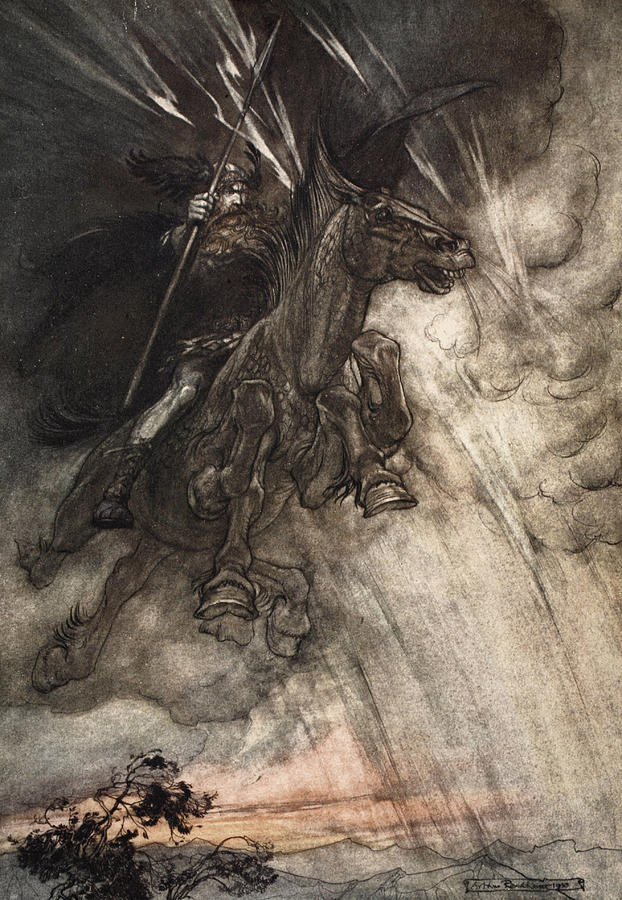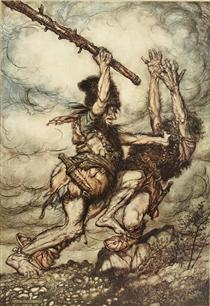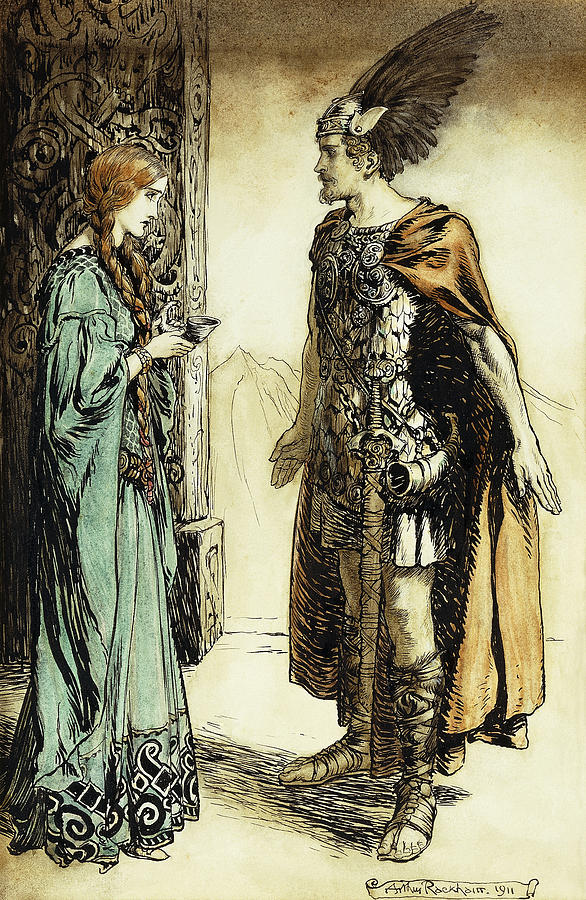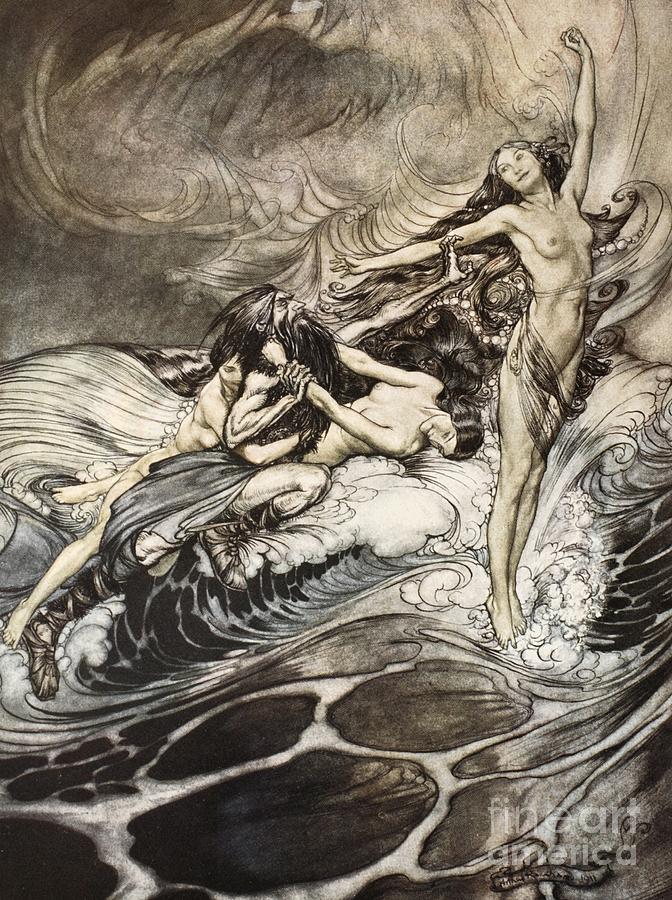Oh frabjuous day. The time is at hand. Today we discuss Wagner’s sublime operatic masterpiece Der Ring des Neibelungen (The Ring of the Nibelung), haphazardly translated by the improbably awesome-named John Deathridge but mostly read in its original German. Not quite mythology but a Teutonic alloy of Norse and German Myth, it sears and blares of the pages, brimming with forceful vibrancy, shaming the quiet medium of the written word. Love doesn’t shine IT BURST FORTH WITH SEARING RAYS. Swords are splintered. Oaths are broken. Woe! Deathridge’s at times low-energy translation doesn’t do justice to the curt, forceful operatic majesty of the original german. This is something made to be performed with sweeping gestures, wearing horned helmets and plate bra’s against a painted backdrop of Alps. In Dutch we have word called gebiedende wijs, which is a form of address you use if you order someone around. In Die Ring, everything is gebiedende wijs. To my rare german readers, please forgive any glaring travesties of language I might have inflicted with my own fumbling attempts at translation.
The Ring Des Niebelungen is a masterpiece of fantasy taking place in four magnificent Acts. It is the one thing (okay, perhaps Faust also), that would make me get tickets for a theatrical performance. It’s DNA is archetypal legend, myth: the Song of the Niebelungs, the saga of the Volsungs, the Edda’s.

3 Water nymphs guard a hoard of enchanted red gold, the Rhinegold. Only one who forsakes all Love can forge it into a Ring of Power to rule the world.
Nur wer der Minne Only one who forsakes,
Macht versagt, Love’s Power,
Nur wer der liebe, Only one who chases off,
Lust verjagt. Sweet Lust.
nur der enzielt sich den Zauber, Only he can achieve the Magic,
zum Reif zu zwingen das Gold To force the Gold into a Ring
Spurned and mocked by the Rhinedaughters for his lascivious affections, the villainous dwarf Alberich steals the Gold, forges the Ring and enslaves his Nibelung brethren, amassing a great hoard and forging a mighty army of darkness.
Meanwhile in Walhalla, Wotan (German Odin) and pals try to scam the two Giants (Fasolt and Fafner) that constructed their God Fortress (literally, Der Göttesburg, in german you can mash those words together and they sound awesome), since they basically promised them Freya in return, and with her the Golden apples that grant them Immortality. Note that in Norse Mythology, Giants are no mere monsters but the adversaries of the Gods, the greatest of them comparable in power. Wotan keeps his Pacts engraven on his spear, wrought from the wood of the Worldtree itself, and he is bound by them. In the original Viking legend, the half-giant Loki scams the fortress building giant by shapechanging into a female horse and having sex with his horse, thereby making sure the fortress is not completed on time and giving birth to Sleipnir.

Wo freier Mutt frommt, Where free courage reigns,
allein frag ich nach keinen, Alone I ask for no one,
Doch des Feindes Neid, But to make of use,
zum Nutz sich fügen, The Foe’s Envy,
lehrt nur Schlauheit und List, Only Cunning and Guile will serve,
wie Löge verschagen sie übt. Like Löge practices.
Der zum Vertrage Mir riet, The pact was his council,
versprach mir, Frei zu Lösen: He promised me, to free Freia:
auf ihn verlas ich mich nun. On him I now rely
In this version, Loge (German Loki, which is close to Löhe, meaning Flame), is implied to be raw elemental flame, bound by the might of Wotan, and convinces them to trick the Giants into accepting the Rhinegold instead. He slyly mentions how the Rhinedaughters asked for help against Alberich, manipulating them all. They descend from Walhalla’s height into the Depth’s of the Earth.

In the depths, Alberich demonstrates his boundless might and cruelty by using the Tarnhelm, an artifact made by his brother Mime and enchanted by Alberich, to invisibly whip him. He is wholly evil, having forsaken love’s delights for the harsh caress of ultimate power. With the Ring he compels the dwarves to abandon their crafting of beautiful objects and instead slave in the mines and add to his horn. The Ring gives him Lordly might, the Tarnhelm allows him to assume any shape. He is a dark Lord, every bit as evil as Sauron, cruel, spiteful, and his hunger for power is matched only by his exuberant evil.
Die in Linder Lüfte Weh’n, There where soft breezes blow,
da oder ihr lebt, There where you live,
lacht und liebt: – Laugh and Love:-
mit goldner Faust With Golden Fist,
euch Göttliche fang’ ich mir alle! I will catch all you Godly Ones!
Wie ich der Liebe abgesagt, As I have abolished Love,
alles, was lebt, all that lives,
soll ihr entsagen! will renounce it!
Mit Golde gekirrt, Lured with Gold,
nach Gold nur sollt ihr noch gieren! for Gold alone should you crave!
Auf wonnigen Höh’, On blissful heights,
in seligem Weben In a blessed weave,
wiegt ihr euch; you cradle yourselves;
den Schwarzalben, The Black Dwarves,
verachtet ihr ewigen Schwelger! you eternal Revellers despise!
Habt acht! Take Heed!
Habt acht! Take Heed!
Den dient ihr Männer When your men will serve,
erst meiner Macht, my Power,
euhre schmucken Frau’n, your delightful women,
die mein Frei’n verschmäht, who have spurned my advances,
sie zwingt zur Lust sich der Zwerg The Dwarf will ravish (?),
lacht liebe ihm nicht! if love does not smile on him!
Hahahaha! Hahahaha!
Habt ihr’s gehört? Have you heard?
Habt acht! Take Heed!
Habt acht vor dem nächtlichen Heer, Take heed of the nightly Host,
entstiegt des Nibelungen Hort arising from the Nibelung’s Hoard
aus stummer Tiefe zu Tag! out of silent Depths Into Day!
Alberich is defeated with trickery as Löge uses his wiles to get him to turn himself into a toad, after which they quickly overpower him and take the hoard, ring and Tarnhelm from him. Incensed, he pronounced a curse on the Ring and finally escapes. Back in Walhalla, the Giants, after much quibbling, agree to take EVERYTHING in exchange for the Ring. Even here Wotan struggles to give it up, the Urmother Erda comes by to pronounce DOOM and with the greatest of effort he finally hands it over to the giants. The curse proves true as Fafner kills his brother in a disagreement over the ring. As time passes he retreats into a cave, and his boundless greed for the cursed gold turns him into a Dragon, a monster born of no womb but engendered by a curse. We see here Wotan’s arrogance as he sneers at the Rhinedaughters that beg him to return the lost gold, seeing that away from the Rhine it can cause only doom.

The Second ACT begins in the world of mortals in the House of Hunding. The Fugitive Siegmund staggers inside and asks for aid. Hunding’s Wife Sieglinde persuades her husband to allow him to stay the night. He is named Wehwalt (Sorrow Reigns) for he can bring only grief. They fall in love as he regales his backstory, immediately familiar to anyone who has ever seen Conan. His name is well chosen, as he brings nothing but grief to all he meets.

Ein traurigers Kind, A sorrowful child,
rief mich zum Trutz called me to arms:
vermählen wollte To wed wanted,
der Magen Sippe her kinsmen,
dem Man ohne Minne die Maid the Maiden to a Man without Love
Wider dem Zwang, Against duress,
zoch ich zum Schutz; I offered protection;
der Dränger TroB The urgent lot,
traf ich im Kampf I met in Battle.
Erslägen lagen die Brüder; Slain lay the Brethren;
die Leigen umschlang da die meid, The Maiden hugged their corpses
den Grimm verjagt’ ihr den Gram Her grief chased away her fury.
Mit wilder Tränen Flut, With a wild flow of tears,
betroff sie weinend die Wal she covered the slain
um des Mordes der eigener Brüder For the murder of her own Brothers
klagte die unsel’ge Maid. grieved the luckless maiden.
Der Erschlagnen Sippen The stricken kinsmen,
stürmten daher; rushed there;
übermachtig Overwhelming
ächtzen nach Rachen sie they groaned for revenge:
Rings um die Stätte Around the Site,
ragten mir Feinde rose up my Foes
Doch von der Wal But from the Slain,
wich nicht die Maid; yielded not the maid
mit Schild und Speer With Shield and Spear
schirmt’ ich sie lang long I protected her
bis Speer und Schild Until Spear and shield,
im Harst mir zerhaun In the thick were hewn from me
Wund und waffenlos stand ich, Wounded and weaponless I stood
sterben sah ich die Maid: Die I saw the Maiden:
mich hetzte das wütende Heer The furious host hounded me
Nun weibt du, fragende Frau, Now you know, questioning Lady,
Warum ich Friedmund nich heibe! Why my name is not Friedmund
These types of marital struggles are the driving force behind much of the conflict in the Ring. Sieglinde and Siegmund elope, Hunding following. Wotan sends the Valkerie Brünhilde to slay Siegmund to appease his jealous wife Fricka. Gutrune ensnares Siegfried with a love-potion, Brünhilde is so devastated she convinces her now husband to kill Siegfried, marriage and courtship in this mythic are of towering importance.

A second object of Power appears. The Blade Nothung, stuck in an oak in Hunding’s Hall by Wotan the Wanderer and capable of felling any foe. Only Siegmund is strong enough to retrieve it. Through this tale Siegmund and Sieglinde discover they are brother and sister, making their courtship the ultimate taboo. Wotan’s smudgy hands are all over this as he seeks to create a hero who can achieve things even the gods cannot. Unfortunately Fricka has had it with his constant infidelities and his incest so she berates and harangues him into dooming the poor bastard. Brünhilde, favoured daughter, born of the Urseer to avert prophesized doom, is charged with ensuring Siegmund falls. She isn’t taken with it so Wotan gives her the 19th century equivalent of the Marine copypasta.
Ha Freche du! Ha you Brazen!
Frevelest du mir? Do you blaspheme me?
Wer bist du, als meines Willes Who are you, but my Will’s
blind wählende Kür [1]? blind chooser? [1]
Da mit dir ich tagte, When I met with you,
sank ich so tief, Did I sink so low
dab zum Schimpf der eigenen That an insult to my own
Geschöpfe ich ward? offspring I became?
Kennst du, Kind, meinen Zorn? Do you know, Child, my Wrath?
Verzage dein Mut, Despair of your Courage,
wenn je er zermalmend If ever its crushing glare
auf dich stürtze sein Strahl! would fall on thee!
In meinem Busen In my bosom
berg ich den Grimm, I hold the fury,
der in Grau’n und Wust that in gloom and ruin
wirft eine Welt, can cast a world,
die einst zur Lust mir gelacht. That once smiled on me in pleasure.
Wehe dem, den er trifft! Woe to those, whom it strikes!
Trauer schüf ihm sein Trotz! To sorrow would turn their defiance!
Drum rat’ ich dir, Therefore I council you,
reize mich nicht! do not try me!
Besorge, was ich befahl: Deliver, what I command:
Siegmund falle! Siegmund falls!
Dies sei der Walküre Werk! This shall be the Valkerie’s Deed!
When Sigmund meets Brünhilde he refuses to go willingly into Valhalla, for to do so would be to abandon Siglinde. So moved by his valour is Brünhilde that she decides to aid him instead. In one of the dramatic scenes Wotan appears at the last moment to shatter Nothung and Siegmund is struck down. Sieglinde flees, bearing off the shards of Nothung. Carelessly Wotan slays Hundig, and first scornfully, then finally with understanding places Brünhilde, stripped of her Valkery-status, on a mountainous Crag in eternal sleep, wreathing it in Loge’s Fire, that will burn all but the fearless, destined to be the bride of the fearless man finds her.

Now enter Siegfried. Born by Sieglinde in the savage Wilderness, raised by Mime the Dwarf for nefarious purpose, our dashing hero is impetuous and forceful and fearless. He captures Wild Bears and casts scorn at the duplicitous Mime. He shatters the Swords Mime would forge for him, and seeks to learn fear. Finally he takes the shards and forges Nothung anew.
Against Fafnir Mime steers him, to learn fear. Every day Fafnir comes out of his cavern to drink, spraying all before him with burning poison. Siegfried hides and stabs the Wyrm in its heart. By drinking Fafnir’s heartsblood, he gains knowledge of the language of Birds, and soon heeds their instructions and warnings about Mime’s treachery, slaying him. Girded with the Tarnhelm and Ring, he ascends the rocks. Wotan himself fails to stop him, his spear is shattered and with them all the holy compacts engraven upon it, and as he meets Brünhilde, the Doom of the Gods is sealed.
Durch brennendes Feuer Through Burning Fire
fuhr ich zu dir, I go to you,
nicht Brünne noch Panzer neither Mail nor Armour
barg meinen Leib: girds my body:
nun brach die Lohe but flames broke
mir in die Brust; out in my Breast;
es braust mein Blut It boils my Blood
in blühender Brunst in blooming heat
ein zehrendes Feuer a searing fire
ist mir enzündet: is ignited in me
die Glut die Brünhilds the glow that burned
Felsen umbrann, Brünhilds rocks,
die brennt mir nun in der Brust! now blazes within my chest
O Weib! Jetzt lösche den Brand! O Wife! Quench now this fire!
Schweige die schäumende Wut! Silence this seething fury!
The last Act, Twilight of the Gods, is magnificently tragic. It begins with the Norns relating the fall of Wotan, how the security for his Pacts was the World, and how he had his heroes cut down the World-tree, pile them up in his hall, and will soon set fire to it by stabbing treacherous Loge, now no longer bound, in the heart.
This tragedy is compounded by a Tragedy on earth, Siegfried, invincible hero, is coveted by many, and the Lady Gudrun and her brother Gunther crave Siegfried’s aid and the power he would bring them. Both desire a consort. The true villain here is Hagen, aged before his years, who we discover he is actually Alberich’s son.

Wagner magnificently reweaves the saga of the Volsungs by having Gudrun wipe away all memory of Brünhilde from Siegfried’s mind with an elixer, making him agree to fetch Brünhilde as a bride for Gunther in exchange for Gudrun’s hand. In the original myth Sigurd used unspecified sorcery to take the form of Gunther, but here he uses the Tarnhelm and the Ring, which is always with him. In Gunther’s shape he walks through the flames and steals away Brünhilde, who follows miserably. Later the deception is revealed as Brünhilde is forcably wedded to Gunther and discover Siegfried lives but claims not to know her.
Unable to know a single day of happiness, she harangues and wails until Gunther, egged on by Hagen, plans to murder him for breaking his sacred vows. She tells them his weakness, only in the back can he be dealt a wound, for her protection of him extends only to his front since he would ever face the foe. On the day of the twin weddings Hagen comes with an army. Before he falls, Siegfried is given one last chance to revoke the Ring and give it back to the Rhinedaughters, which he refuses.
The eventual betrayal is tragic and the conclusion of heartrending potency. Gudrun bereaved, Gunther shocked, Brünhilde orders wood and oil be braught, and a great funeral pire be made. In her last ode, she calls on Loge, now free, to journey into Walhalla, igniting the fires there, as she charges into the pyre on her destrier, joining Siegfried in death. In the Heavens, Valhalla burns in tandem. Hagen tries to snatch the Ring as the Rhine overflows, but is carried off by the Daughters.
Fliegt heim, ir Raben Fly home, you Ravens
Raumt es euhrem Herren, Whisper to your Lord,
was hier am Rhein hier gehörrt What you have heard here on the Rhine
An Brünnhildes Felsen Past Brünhilde’s Rocks
fahrt forbei; Fly:
der dort noch lodert He blazes there still
weiset Loge nach Walhall point Loge to Walhalla
Denn der Götter Ende The End of the Gods
dämmert nun auf Dawns Now!
So – werf ich den Brand Like this – I cast the firebrand
in Wallhall’s prangende Burg into Valhalla’s splendid fortress

A searing, majestic opera of apocalyptic pagan splendor. Heroes, Sorcery, Doom and Destiny abound. Unlocking the true potential of fantasy means digging into its roots and few works have their roots sunk so deep into the bedrock as Die Ring Des Niebelung. Bring Wood and Oil!
I’ll be back with a review of Mists of Akuma for 5e. After that it’s the regular programming, and some new donations! Have a fantastic weekend everyone!
[1] Walkure. Choosers of the Slain. It’s hard to convey in terse fashion the exact sense of what Wagner is saying here, that Brünhilde is an extension of Wotan’s Will, blindly selecting those that fate has ordained have died gloriously and enter Walhalla ( literally the halls of the slain).

Did you know arthaus homo in German is spelled Arthaus Homo?
In all seriousness though I am pretty impressed by your translation. Cool to see you try something different.
LikeLike
My fucking game for tonight got tanked 😦
Thanks for your kind words. I think the problem with the Deathridge translation is that A) it isn’t consistent about trying to capture the literal translation vs the meaning of what is being said and B) the language is colloquial english. The ideal style should be something like E.R.R. Eddison’s translation of Egil’s Saga, old english, which seems to be much closer to german. Not enemies but Foes = Feinden, ZauserKunst = Sorcery, fellen = to fell etc. etc.
LikeLike
An enjoyable read, very scholarly. I agree that translations (of ancient sagas) should not be in colloquial English. I remember a spoof comedic translation of Romeo and Juliet, where a line of Montague “Affection makes him false. He speaks not true” becomes “He is pissing on your back and telling you it’s rainin'”. The Prince becomes a police captain, etc.
LikeLike
Same as the E.V. Rieu translation for the Illiad. ‘Let’s go M’lads’ or something. Dreadful. The Poet Scholar remains the best option.
LikeLike
What do you think of his last opera? The tower of sirens is wild town
LikeLike
I can’t comment, this is the only one I’ve checked out. Given its qualities I’ll make sure to check out others. I thought his last opera was Parcival?
LikeLike
Yeah, its Parcival. Its ethereal as all get out. Wild and crazy boys town.
LikeLike
Fuck I’ll give it a shot. Thanks for the recommend. You doin’ all right old son?
LikeLike
I’m surprised the “symbolic transformation” (or more specifically the reflection of one’s current self) didn’t make its way into popular memory. The closest I can think of is Gollum,but even then he didn’t turn into a dragon of all things.
Also.what makes you say Loge in this version is primordial fire?
LikeLike
The symbolic transformation definitely made its way in, even now. Think about Darth Vader or Dracula or any of the dozens of comic book villains that start as evil scientists and become twisted reflections of their sins. Dr. Doom. The World of Warcraft King Arthas. That sort of shit is too primal to be lost. It can be trained out but I think men are born with it. It’s probably ironic that you don’t see it in fantasy novels that often but I’d be willing to bet any decent Lotr clone has a character like it.
[Loge]
Its a quote at the End of Act I: Scene Four. Loge contemplates the Gods as they go back to Valhalla, Fafnir takes the Ring.
zur leckenden Lohe to change myself back into
mich wieder zu wandeln, flickering flames,
spür ich lockende Lust: I feel tempting desire;
sie aufzuzheren, To burn out,
die einst mich gezähmt those that once tamed me
Wotan binds him into flame form around Brünhilde’s rocks, and at the Twilight of the Gods, he mentions that with the spear broken, his hold of him is lost. He has them cut down the World Tree and pile up the logs in his hall, so that when he stabs Loge through the heart, the resulting inferno will consume all of them. I looked it up because I love this book. It’s at the end of Act II.
Loge, hör! Loge, Hear!
Lausche hieher Listen here
Wie zuerst ich dich fand, Like first I found you,
als schwiefende Lohe; as wandering Flames;
wie ich dich band, Like I bound you then,
bann’ ich dich heut! I bind you now!
I think Loge is a sort of thematic crossbreed between Loki and the ferocious Surtur, the Fire Giant that will annihilate the gods and set the world ablaze during the Ragnarok.
LikeLiked by 1 person
I love how many characters pop up as crazy powerful. They are not explained, powers do not matter. They fight and loose and all for the ring. Even those who swear it off.
Heck when Odin just gives up by the end. Kill me I am done. You got it old boy the old ways are dead and I killed them.
Even upon realizing his hubris he only has others kill him to avoid its allure.
This always struck me as similar to Bilbo in the end of lotr. JRR for sure ripped it from here. Take this thing away, all will fall under its grasp. Its all about dem apples and that dang tree
LikeLike
Killing yourself when you fuck up is a very pagan thing I think. We all have this image of Viking Berserkers fighting on with mortal wounds but that’s only if you are going to Valhalla. If the alternative is dishonor they’d rather croak. Very common. From Ajax to the characters in the Ramayana or the Romance of the Three Kingdoms. Especially women.
There’s a lot of commonalities between RotN and LotR, probably too much to ignore, even if you accept they both read the Saga of the Volsungs. J.R. was not a fan of Wagner’s outlook on life so perhaps he didn’t want to give him the credit?
LikeLike
It seems to be my lot in life to lower the tone, in this case by introducing a children’s novel. In Voyage of the Dawn Treader (Narnia, C.S. Lewis), Eustace finds a dragon hoard, starts thinking selfish dragonish thoughts, and transforms into one.
LikeLiked by 1 person